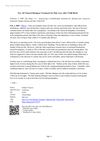 January 2015 in “Springer eBooks”
January 2015 in “Springer eBooks” The document concludes that managing PCOS involves lifestyle changes, medication, and monitoring for associated health risks.
 4 citations,
December 2009 in “Current Medical Research and Opinion”
4 citations,
December 2009 in “Current Medical Research and Opinion” Dermatologists are more comfortable and proactive in treating male pattern hair loss than primary care physicians.
 3 citations,
July 2011 in “Journal of the Egyptian Women's Dermatologic Society (Print)”
3 citations,
July 2011 in “Journal of the Egyptian Women's Dermatologic Society (Print)” Acne is common in adult women, often continues from adolescence, and can lead to scarring.
 41 citations,
April 2010 in “Gender Medicine”
41 citations,
April 2010 in “Gender Medicine” The conclusion is that hirsutism should be diagnosed and treated because it affects quality of life and may signal other health problems.
 5 citations,
September 2021 in “Journal of The American Academy of Dermatology”
5 citations,
September 2021 in “Journal of The American Academy of Dermatology” Most men with Frontal fibrosing alopecia also lose facial hair and the condition may be linked to hormone levels and sunscreen use.
2 citations,
March 2011 in “International Journal of Dermatology” An 18-year-old man was diagnosed with a rare genetic disorder causing hair loss, severe light sensitivity, and skin issues.
 August 1996 in “Journal of Pediatric and Adolescent Gynecology”
August 1996 in “Journal of Pediatric and Adolescent Gynecology” The document concludes that PCOS in adolescents is complex and requires comprehensive care to manage its symptoms and associated health risks.
 34 citations,
September 2020 in “BMC Endocrine Disorders”
34 citations,
September 2020 in “BMC Endocrine Disorders” Existing drug dexamethasone may lower death risk in severe COVID-19 cases; more research needed for other drugs.
 25 citations,
July 2021 in “Journal of Medical Virology”
25 citations,
July 2021 in “Journal of Medical Virology” COVID-19 can cause various skin issues, including rashes and hair loss, which usually heal on their own and don't always indicate severe illness.
 June 2016 in “CRC Press eBooks”
June 2016 in “CRC Press eBooks” Sleep problems and skin issues affect each other; poor sleep can worsen skin conditions, and some skin treatments can improve or harm sleep quality.

The book provides a guide to cosmetic surgery for people with darker skin, covering various treatments and addressing their unique skin characteristics.
 31 citations,
October 2013 in “Psychosomatics”
31 citations,
October 2013 in “Psychosomatics” Psychotropic medications can cause skin reactions, including severe conditions like SJS and TEN, and it's important for psychiatrists to recognize and manage these side effects.
 14 citations,
September 2019 in “Eye”
14 citations,
September 2019 in “Eye” Some oral medications may help treat central serous chorioretinopathy, especially eplerenone, but more research is needed.
 73 citations,
March 2014 in “Journal of The American Academy of Dermatology”
73 citations,
March 2014 in “Journal of The American Academy of Dermatology” Most dermatologic medications are safe during pregnancy and breastfeeding, but some should be avoided due to potential risks.
 52 citations,
February 2006 in “Archives of Dermatology”
52 citations,
February 2006 in “Archives of Dermatology” Alefacept may effectively treat severe lichen planus, with patients showing significant improvement and no side effects.
 52 citations,
June 1999 in “Endocrinology and Metabolism Clinics of North America”
52 citations,
June 1999 in “Endocrinology and Metabolism Clinics of North America” Antiandrogen treatments combined with oral contraceptives can help manage hair growth and hair loss in women with PCOS.
 37 citations,
April 1979 in “The Journal of Clinical Pharmacology”
37 citations,
April 1979 in “The Journal of Clinical Pharmacology” Minoxidil effectively controls blood pressure but side effects may limit its use.
 23 citations,
January 2010 in “Journal of The American Academy of Dermatology”
23 citations,
January 2010 in “Journal of The American Academy of Dermatology” Effective treatments for lichen planopilaris are unclear due to inconsistent results and a lack of strong research evidence.
 20 citations,
March 2006 in “Seminars in Cutaneous Medicine and Surgery”
20 citations,
March 2006 in “Seminars in Cutaneous Medicine and Surgery” Minoxidil and finasteride can help with hair loss, but more research is needed to improve treatments for certain types of hair loss.
 19 citations,
July 1990 in “Cleveland Clinic journal of medicine”
19 citations,
July 1990 in “Cleveland Clinic journal of medicine” Androgen excess disorders in women were effectively treated with spironolactone, estrogen, and dexamethasone.
 17 citations,
February 1989 in “Fertility and sterility”
17 citations,
February 1989 in “Fertility and sterility” Cimetidine did not reduce hair growth in women with hirsutism.
 10 citations,
January 2016 in “Dermatologic Clinics”
10 citations,
January 2016 in “Dermatologic Clinics” Some acne medications have side effects; doctors should educate patients and may not need to do frequent lab tests for all.
 7 citations,
September 2013 in “Current Dermatology Reports”
7 citations,
September 2013 in “Current Dermatology Reports” Some skin medications are safe for pregnant women, but others pose risks or should not be used.
 2 citations,
March 2004 in “Reviews in Gynaecological Practice”
2 citations,
March 2004 in “Reviews in Gynaecological Practice” Hormonal changes and psychological issues can cause sexual dysfunction in postmenopausal women. Behavioral therapy is recommended first, with hormone replacement helping some symptoms but not libido. Testosterone can improve libido, but its effects on overall sexual function are unclear. Emotional and relationship issues should be addressed before using medication, and the benefits and risks of testosterone supplementation should be considered.
 March 2022 in “International journal of biology, pharmacy and allied sciences”
March 2022 in “International journal of biology, pharmacy and allied sciences” Ayurvedic treatment with local herbal applications successfully regrew hair in a patient with alopecia areata.
 October 2018 in “Springer eBooks”
October 2018 in “Springer eBooks” The document concludes that various topical medications are effective for skin conditions but often cause skin irritation as a side effect.

The new all-natural shampoo treatment can prevent hair loss and encourage hair regrowth in new mothers.
 159 citations,
March 2014 in “Journal of The American Academy of Dermatology”
159 citations,
March 2014 in “Journal of The American Academy of Dermatology” Some skin medications are safe during pregnancy and breastfeeding, but others can harm the baby and should be avoided.
 105 citations,
February 2011 in “The Journal of Clinical Endocrinology & Metabolism”
105 citations,
February 2011 in “The Journal of Clinical Endocrinology & Metabolism” Treating sleep apnea in young obese women with PCOS can improve heart health and insulin sensitivity.
 78 citations,
March 2017 in “JAMA Dermatology”
78 citations,
March 2017 in “JAMA Dermatology” Tofacitinib helped regrow hair in people with severe alopecia, but side effects occurred and benefits stopped after treatment ended.





























